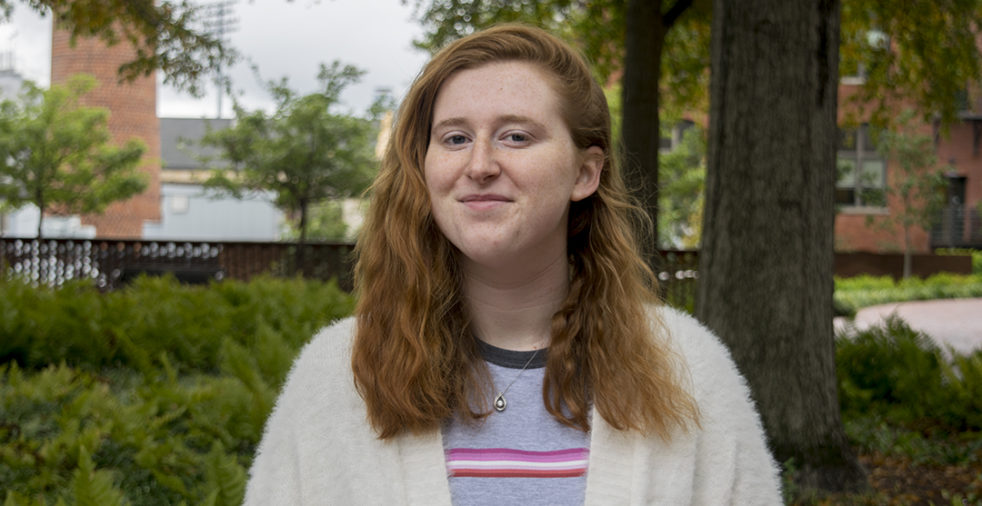Gender, sexuality and identity are never easy. Oftentimes I hear that the spectrums that these things lie on are too complex to define and can therefore be ignored. Words are always changing, so one person’s definition of some identity may completely differ from another’s. While I agree that gender and sexuality are fluid and that identities can change over time, I also firmly believe in the power of the language surrounding them; the complexities of gender and sexuality must be confronted face on with the intricacies of this language explored and embraced, not brushed to the side or belittled.
What does the word “lesbian” mean? To me, and to most other lesbians, it means a woman-aligned person (i.e. a woman or a non-binary person who personally identifies with womanhood) who is solely attracted to other woman-aligned people. There is something unique about the experience of women exclusively loving other women without male involvement.
This uniqueness defines lesbianism. There are other women-loving-women, of course — bisexual, pansexual, polysexual and even some asexual women all fall under the wonderful umbrella of girls who like girls, generally referred to as “sapphic” identities. But lesbians in particular do not feel attraction to men, and this is an experience that cannot be shared by other sapphic people and thus defines the lesbian community exclusively.
When we allow people to misuse the vocabulary of a community with such strong historical context, harm to those who belong to the community is inevitable. When my bisexual friends call themselves lesbians and go on to date men — something that is obviously wonderful and acceptable for bisexual and other sapphic women to do — it perpetuates the all-too-familiar myth that women who call themselves lesbians can be “turned straight” if they find the right man.
In the past, the act of misusing the word “lesbian” has lead to harmful action against them: sexual assault and harassment, corrective rape, physical abuse, verbal defamation and more. When society believes that a woman who says she is a lesbian is lying or could change her mind, it presents a real danger for other lesbians. When men believe that lesbians are sexually or romantically available to them, problems arise for the lesbians’ level of safety and autonomy.
So when a bi, pan, poly or asexual woman says that she is a lesbian despite having acknowledged attraction to men, she is perpetuating what amounts to be a truly dangerous myth, unintentionally or not.
Whether I like it or not, labels influence how I am perceived and how I experience the world. My label is strongly tied to my experience; thus, when others use that label without actually having lived my experience, it cheapens my use of it as well as my experience because of how interconnected the two are.
Respecting identities and their communities means respecting the language tied to them. As someone who previously identified as bisexual, I understand that identity is inherently fluid, but when language has such an impact on our society it’s important that we are consistent in our use of language when expressing those identities.
Some may see my rigidity as “gatekeeping.” I have been criticized on social media platforms time and time again over my opinions on the topic. I don’t mean to say that people are not allowed to identify as lesbians — just not people who do not fit into the lesbian definition. As of late, there has been a trend within the LGBTQIA+ community to reject labels for their oppressive potential, but as someone who takes great pride in and finds deep comfort in my label, I firmly believe that, though they can be used against us, labels have power.
Once we, as a community, decide that labels no longer have meaning, then we fall down a rabbit hole of ignoring the cultural impact of all defining words. Therefore words must continue to have meaning, and these meanings must be maintained if any semblance of order and respect is to be expected.
Sometimes, what we call gatekeeping is more like safeguarding. I don’t allow my heterosexual, bisexual, pansexual or otherwise non-lesbian friends to call themselves lesbians. I know the common understanding and perception of this could be harmful to my lesbian friends and myself — I hold this definition of lesbianism to protect, not to harm or exclude. There are plenty of other identities that can be adopted by someone looking for a community, but if the person experiences attraction to men, they should look outside of the label “lesbian.”
Words have meaning. Words have impact. Using words incorrectly has the potential to do damage to an already misunderstood and oppressed community. Ignoring the context revolving around language is just as ignorant as intentionally using the wrong words to define ourselves. Using words incorrectly and calling ourselves what we are not does not lead to liberation; it just hurts those who are most vulnerable to the negative impact of language.
This issue is more complex than I can really get into here, but in this space I hope I’ve made this point: the language that we use as queer people obviously changes over time as the dialogue surrounding LGBTQIA+ issues evolves, but within this dialogue, we should be asserting the importance of our words in order to protect each other.
